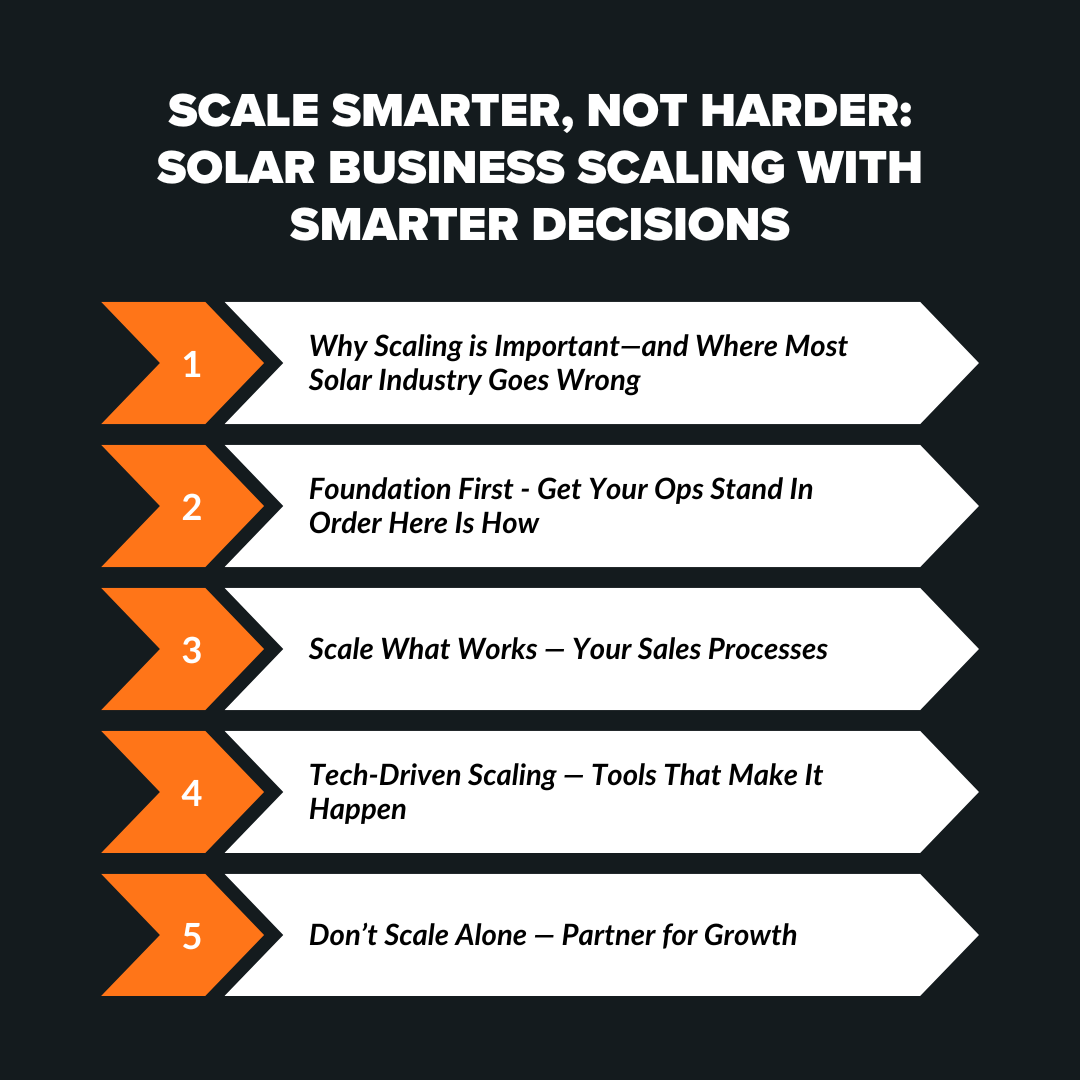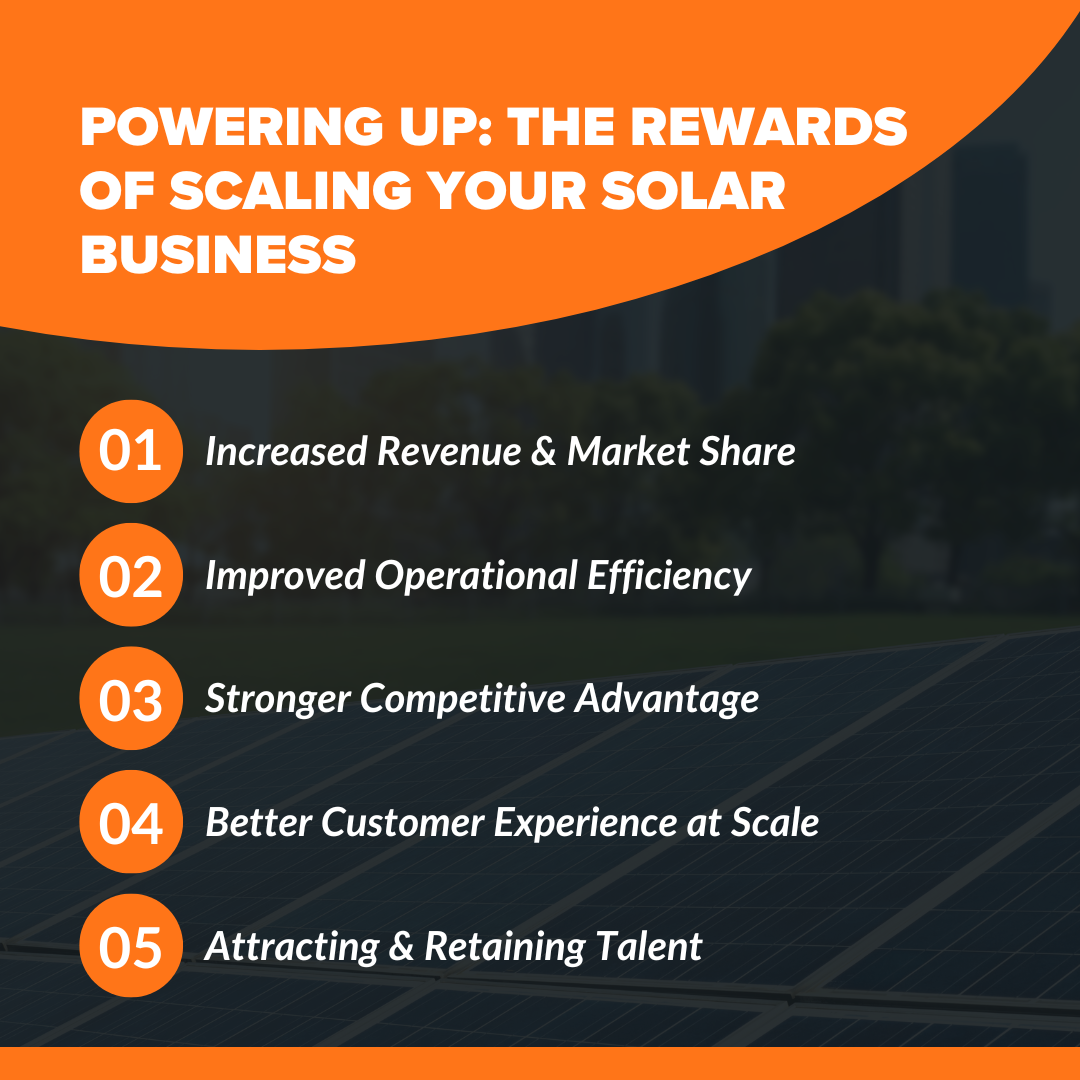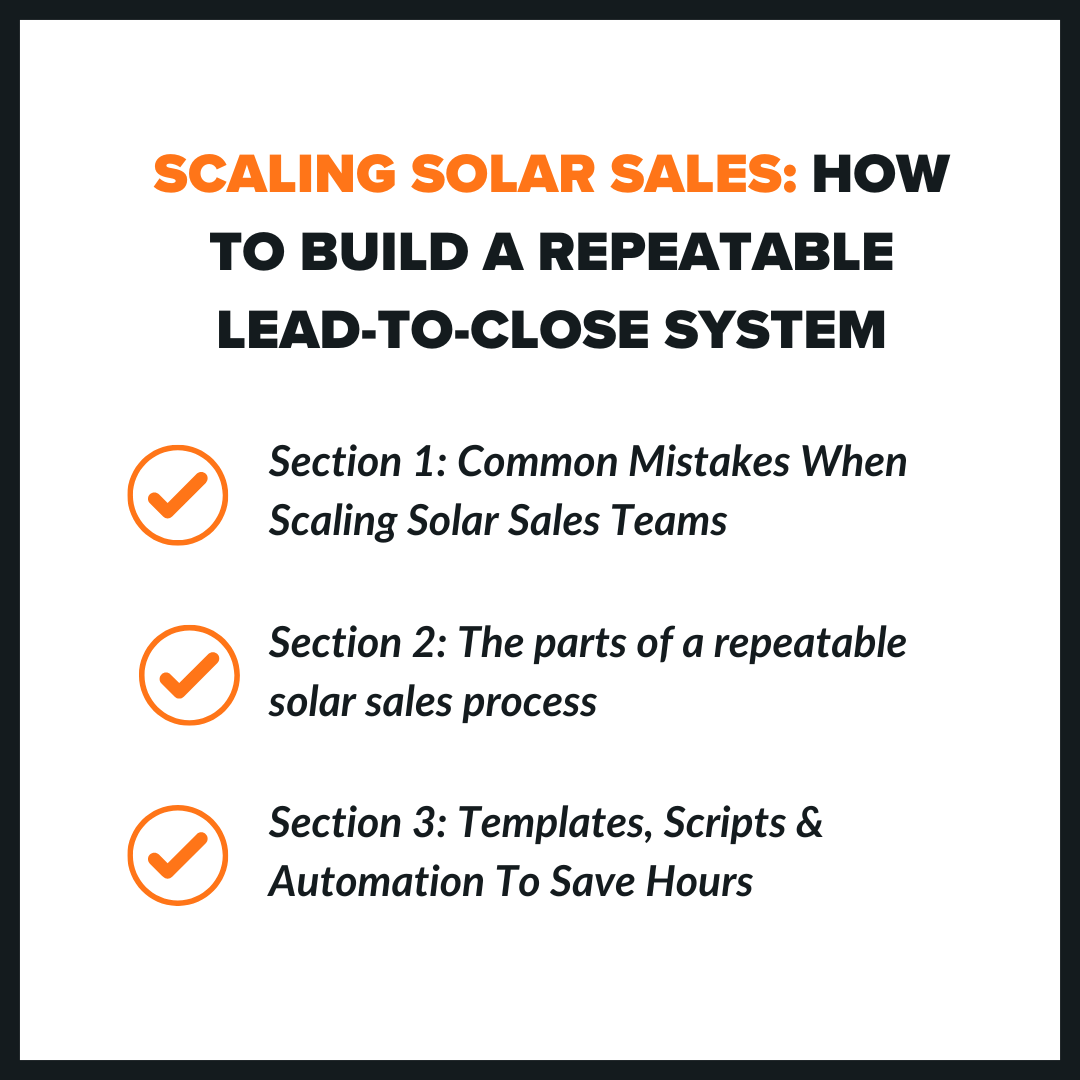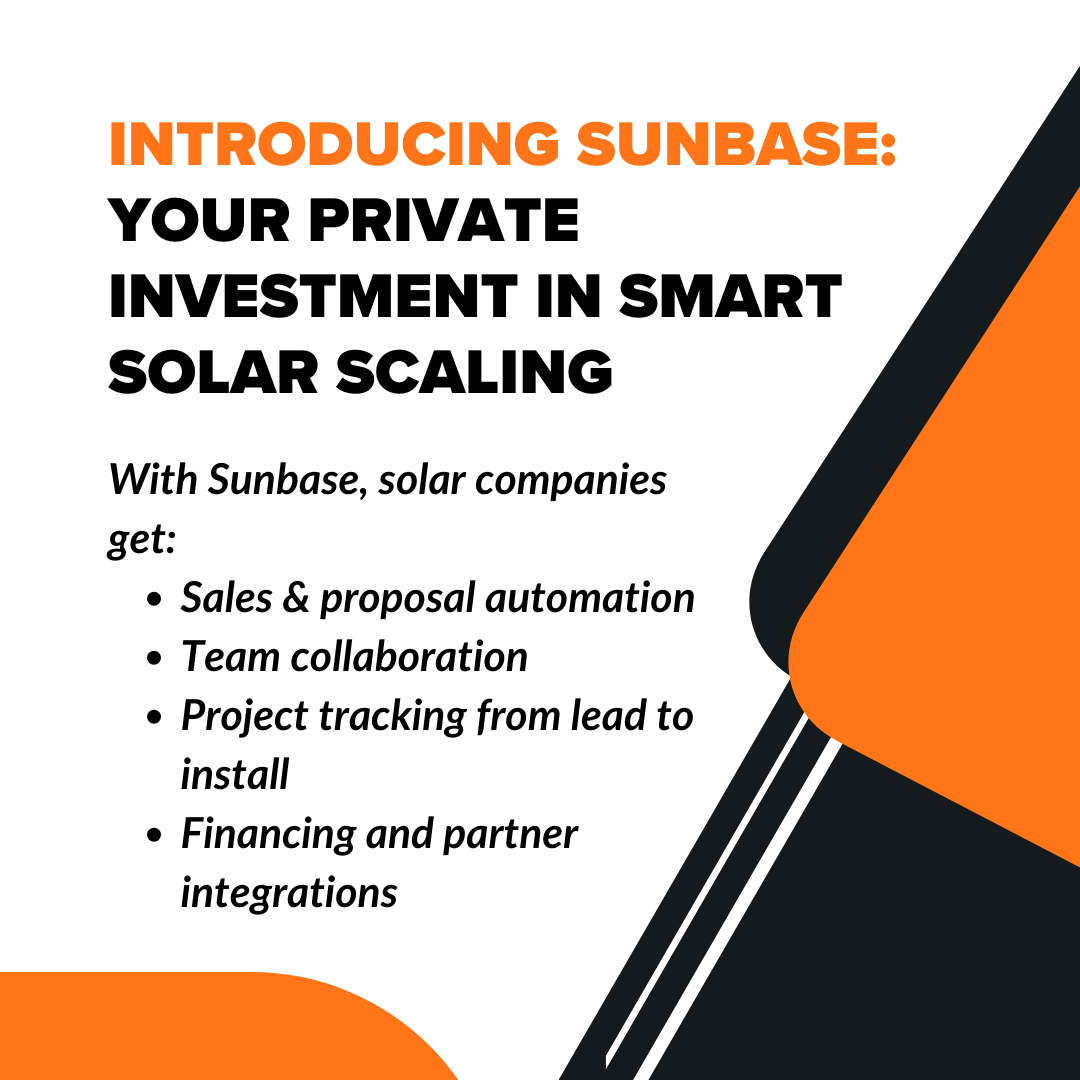June 20, 2025
Audio Overview: Listen & Learn
The volume of solar installations is rising. Reason: increasing demand for sustainable solutions! And soft costs?
They are still on fire!
But here’s the reality solar CEO’s won’t tell you: scaling the solar industry quickly is easy, but scaling smart is where the real challenge lies.
We have seen this repeatedly: solar companies grow from 10 to 50 installs of solar panels per month, only to find themselves treading water due to unorganized teams, cash flow challenges, and broken systems.
Why? Because they scaled without building the foundation first. If you’re here, we are sure you’re asking yourself: “How do we grow solar systems without the chaos?”
That’s exactly what we are going to tackle in this blog. We are breaking down the practical, successful strategies that the smart solar industry is using today to get more done.
Smart Scaling: Proven Growth Strategies for Solar Companies
Smart scaling isn't merely doing more installs or hiring more quickly. It is about building a solar company that can scale without exceeding the demand of potential customers.
It involves aligning your solar business operations, renewable energy technology, people, and solar panels and solar PV partnerships so that as you receive more demand, your systems drive growth, not sink.
The focus is on intentional growth, growth that is sustainable, profitable, and built on a solid foundation. Because scaling quickly without intentional scaling leads to chaos. But scaling smart? That is how you make a solar business that lasts..
Key takeaways:
- Scaling your solar sales is not about chasing more leads; it’s about developing a repeatable solar power system.
- Without a defined process for converting leads into sales, leads get lost in the shuffle, and sales reps will wear themselves out chasing down new leads.
- To achieve repeatable systems, CRMs, automations, and templates create consistency, save time, and increase conversions.
Scale Smarter, Not Harder: Solar business scaling with smarter decisions

The solar business is growing rapidly, but this does not mean every solar power company will grow successfully.
One of the most common reasons solar companies fail is their rapid growth without the proper systems in place.
If you keep expanding your teams to add more markets, or you are adding volume on installs, you can’t ignore one fact: Smart scaling always beats fast scaling.
This guide outlines the proven growth and scaling strategies that high-performing solar companies use to scale smartly, profitably, and sustainably in the long term.
Section 1: Why Scaling is Important and Where Most of the Solar Industry Goes Wrong
Understanding the importance of scaling is crucial, as it enables you to evolve from a small solar power unit into a powerful contender in the market.
Unfortunately, most solar companies hit bumps in the road pretty quickly.
Examples of common mistakes that kill growth:
- Over hiring and taking on more employees with no structure → big payroll, unclear roles
- No automation in place → teams feel buried in admin work
- Sales team outruns ops → installation delays, unhappy customers
> The biggest trap? Confusing “growth” for “scaling.”
Growth involves doing more, whereas scaling involves doing more in a more efficient, profitable, and repeatable way.
Before you insulate yourself to double your installation capacity or battery storage, consider the foundation of the solar energy business you have in place.
Section 2: Foundation First - Get Your Ops Stand In Order Here Is How:
For a new business to scale profitably, it typically must start with its systems.
Consider the following:
- Standardize everything. Create Standard Operating Procedures (SOPs) for solar products, from quoting to installation, and get the entire team using them.
- Use technology for "lean" operations. Implement a centralized CRM and project management platform to reduce maintenance and communication issues.
- Take job costing seriously. If you are not monitoring financials on a per-project basis, scaling incentives can lead to financial instability and potentially bankruptcy.
The bottom line is that operational stability is the basis for growth - you can't scale what is disorganized.
Section 3: Scale What Works - Your Sales Processes
A disorganized sales engine won’t scale. A repeatable one? That is your growth machine.
Focus on the following trends:
- Invest more heavily in your best-performing lead sources: Is it door knocking? Some other digital means? Referrals?
- Develop playbooks: Manufacturing Scripts, follow-ups, automation tools - build them so they are easy to train on and duplicate.
- Use sales data, not your gut: Understand your closing rates, capital, resources, and most profitable solar products.
And don't leave your team out of the mix. Offer better incentives to stay and scale your competition.
Section 4: Tech-Driven Scaling - Tools That Make It Happen
Smart solar companies don’t scale on spreadsheets. They achieve sustainability with automation.
Tools that can unlock smart growth for a developing brand:
- Quoting & proposal software → Shorter sales cycles
- Design automation tools → Reduced back-and-forth on layouts
- Field apps → Job status updates and team coordination in real time
- Integrations → Fewer manual operations, more flow
Pro Tip: Invest in tools before your team has too many tasks to handle.
Section 5: Don’t Scale Alone - Partner for Growth
You can grow without developing everything in-house.
Strategic partnerships hasten the scaling process:
- Installer/EPC partnerships → Broaden service areas and add more capacity without increasing your headcount or manufacturing costs.
- Financing partners → Close more deals with a more compelling offer
- Channel & white label programs → New audience at a bit of cost of capital
- Franchising (or licensing if appropriate) → Grow your presence without losing total power
Scaling is faster when you don't do it alone.
Section 6: Measure, Optimize, Repeat
Scaling isn’t a one-off grid. It is a cycle of testing, tracking, and improving trends to stay ahead in competition.
Track the following KPIs.
- Customer Acquisition Cost (CAC)
- Installation timeline
- Sale close rate
- Tax credits and insurance
Before scaling, make sure you have defined your benchmarks.
“We don’t scale what isn’t working. We fix it and then scale it.”- A smart solar CEO (likely you soon)
Explore: Innovations in Solar Design Software: What to Expect in 2025
Powering Up: The Rewards of Scaling Your Solar Business

1. Increased Revenue & Market Share
Scaling provides access to a progressively larger number of solar panels, solar PV, or renewable energy sources, as well as new customer segments.
With more teams and reach multiplying solar products, you can:
- Take on more installations each month
- Expand your geographic reach
- Diversify your lead channels (residential, commercial, EPC partnerships)
- Close larger projects and more profitable opportunities
The higher your capacity for solar panel installations with promotional content, the greater your revenue growth will be in line with your influence, leading you to become a leader in solar and other markets.
2. Improved Operational Efficiency
A growing business without efficiency creates chaos.
Smart scaling creates systems that eliminate bottlenecks, reduce panel grid, and ultimately provide your team with more resources to be productive.
This means we are expected to use these utilities:
- Automate proposals and follow-ups
- Standardize communication and project timelines
- Utilize CRM and field operations software that teams can leverage to stay aligned
The outcome? Your team does more, faster (with fewer clerical errors), and your profit per job will increase as you reduce wasted time and the insurance costs of additional labor.
3. Stronger Competitive Advantage.
As your solar energy business grows, so does your purchasing power. And your project delivery capabilities, at scale and speed!
This provides you with a significant advantage over smaller or more fragmented competitors.
When you have more resources and better knowledge of utilities, you can:
- Get better pricing from suppliers
- Win contracts that require a greater install capacity or faster delivery with low maintenance costs.
- Spend money on marketing and/or technology, or brand knowledge that most others cannot.
- Your brand becomes synonymous with reliability, speed, and professionalism, and these are the three things that will drive you to power in a crowded solar industry.
4. Better Customer Experience at Scale
Scaling smart preserves quality rather than diminishing it.
When you have the best services and resources, you can ensure ongoing excellence even as volume increases.
That means,
- Accurate quotes and faster turnarounds
- Timely install timelines with clear updates
- Smooth handoffs between sales, design, and install teams
- The better the customer experience, the more referrals, reviews, and repeat business you create, which feeds a positive growth cycle in this industry.
5. Attracting & Retaining Talent
Top talent has two fundamental desires: growth opportunities and a well-run organization.
When your company has the structure to scale, you can provide both of these things.
This is how it works:
- Well-defined career paths = attracting high performers
- Internal promotions = high team morale
- Less burnout thanks to systems and technology
In summary, scaling well makes you the best employer for top talent in a competitive solar job market.
6. Economies of Scale & Financial Benefits
As you increase your volume, the costs per project decrease. This is one of the main financial benefits of scaling.
Major areas of savings are:
- Bulk purchasing solar panels, inverters, and balance of system (BOS) components.
- Reduced per-job marketing costs with optimised lead gen.
- Easier, more streamlined installs with standard operating procedures.
The more efficient you become, the more profit will grow per install, even if your overhead rises.
Discover: From Survey to Sale: How a Solar Proposal Software Reduces Turnaround Time by 50%
Scaling Solar Sales: How to Build a Repeatable Lead-to-Close System

Section 1: Common Mistakes When Scaling Solar Sales Teams
Let's take a look at what goes wrong. When solar companies try to scale their sales without a system, they end up costing themselves millions:
Mistake #1: No Sales Process
Every representative approaches leads differently - some do it immediately, while others lose interest completely. Inconsistent touchpoints = lost deals.
Mistake #2: Leads Are Lost
In the absence of a proper CRM, leads will be stored in a spreadsheet or inbox, and no one keeps track of who has called whom, resulting in prospects falling through the cracks.
Mistake #3: Sales = Outpacing Ops
The sales team is closing deals that the installation team isn't equipped to fulfill, leading to scheduling issues, installation delays, cancellations, and negative reviews.
Mistake #4: No Reporting
If you can't measure what is working, you can't scale it. Many solar teams do not track close rates, sales cycle time, or the performance per lead source.
Before you scale, fix the system.
Section 2: The parts of a repeatable solar sales process
The formula for scaling solar sales is simple and follows an easy-to-remember format that guides every sales representative from initial contact to a closed deal. The basic lead-through-close flow is:
1. Capture the Lead.
In-store, door-to-door, digital ads, referral; no matter how leads come in, all leads need to be routed into your
CRM.
2. Prepare Quote & Proposal.
Use solar proposal software like Sunbase to pull consumption data, create the proposals, and include financing options!
3. Follow Up & Close.
Automate reminders to follow up, or simply use a templated follow-up within 24 hours. Present financing & overcome objections promptly.
4. Handoff to operations.
Once signed, use trigger workflows for site surveys, permit processes, installations, and other relevant tasks.
Section 3: Templates, Scripts & Automation To Save Hours
Your sales representatives should spend the majority of their time selling, rather than getting bogged down in administrative tasks.
Here's how to ensure they can:
Useful Templates:
- Scripts for inbound and outbound calls.
- Email sequences for lead nurture (automated with advanced CRM like Sunbase).
- Template proposals that make pricing, savings, and timelines easy to understand.
Time Saving Automation:
- Lead routing and assigning to reps.
- Follow-up email/text reminders.
- E-signature and proposal approvals.
- Status change and climate change notifications (qualified, quoted, closed).
- These advanced tools allow you to scale your efforts without increasing your daily hours.
Learn more about why an increasing number of EPCs are choosing to invest in comprehensive solar management software!
Sunbase: Your Private Investment in Smart Solar Scaling

Welcome to Sunbase: Your Smart Growth Partner
Sunbase is an all-in-one platform designed to help solar companies grow faster and with more confidence.
From advanced proposals and CRM tools to field collaboration and data analytics, Sunbase will give you the tools you need to scale efficiently without losing control.
With Sunbase, solar companies get:
- Sales & proposal automation
- Team collaboration
- Project tracking from lead to install
- Financing and partner integrations
Scaling is not only easier with Sunbase - it's smarter.
Contact Sunbase to discover how the leading solar companies are driving growth with advanced technology.
Conclusion: Scale with Intention, Not Just Ambition
Let's face it: ambition will get you going. But only intentional scaling will continue your growth.
Solar companies that scale effectively are not just seeking additional leads or more installs; they are investing in repeatable processes, building the right teams, and using technology to deliver excellent customer service that can scale with them.
Think of the future: the systems you use today are what will support a 10x business tomorrow.
So before you start throwing more reps at the challenge or moving to the next zip code, ask yourself:
- Is my operations engine built to scale?
- Am I measuring what matters?
- Do I have the right technology to support it?
If you're thinking 'not yet,' don’t worry; you're not alone, and you don’t have to figure it out alone.
Ready to Scale Smarter with Sunbase?
Sunbase All-in-one Solar Software: Built for Solar Companies Who Want to Thrive!
FAQs
1. What is solar software, and how can it help me scale my business?
Solar software refers to digital tools specifically designed for solar businesses to manage and automate everything from lead generation to project confirmation. This can include CRM software, proposal software, design platforms, proposal builders, finance integration, and project tracking.
2. In what ways does solar software enhance the customer experience?
Solar software like Sunbase can improve customer experience by making the customer journey easier:
- From first contact to final install
- Faster, clearer, and more professional.
- Enhancing the customer journey will result in greater satisfaction, more referrals, and a higher number of positive reviews.
I agree to receive marketing messaging from Sunbase at the phone number provided above. I understand data rates will apply, and can reply STOP to OPT OUT.







